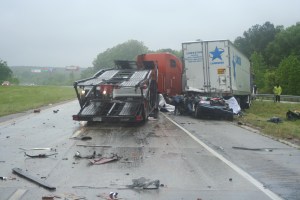Crash Avoidance is a broad topic and I am just beginning to write about it. The basic idea, of course, is to find a way to reduce the number of crashes that take place on our roads. The question is how to do that.
There are many devices and systems being produced and in the process of being developed which could, in fact, make a big difference in preventing collisions. I hope to find out more about them and to advocate for the implementation and regulation of appropriate crash avoidance technologies on large trucks, as well as cars.
Read this article from February 2015, when safety advocates were urging NHTSA to “initiate a rulemaking that would require forward collision avoidance and mitigation braking (F-CAM) systems on all new trucks and buses rated at 10,000 pounds or more GVW. The lobbies argue that specific technology exists that would markedly reduce truck-related crashes if it were mandated on commercial vehicles.”
http://www.automotive-fleet.com/news/story/2015/02/nhtsa-urged-to-mandate-truck-crash-avoidance-technology.aspx
In this same article, the ATA made a statement about the safety advocates’ petition:
“Sean McNally, Vice President of Public Affairs for the American Trucking Associations told HDT, that the trucking lobby ‘supports proven safety technologies that prevent crashes and, therefore, save lives. ATA plans to carefully review the data cited in this petition to make an informed decision on the efficacy of the recommended approach.
“’More importantly,’ he continued, ‘any organization truly interested in highway safety should be urging NHTSA to first take action on ATA’s 2006 petition -now almost nine years old – seeking a new rule requiring large trucks to be electronically speed-governed/limited at no more than 65 mph. [That’s] an approach ATA knows would reduce the frequency and severity of crashes.’”
Of course, there is no proof that the truck driver in our crash was going over 65–just going too fast for the traffic conditions.

Our crash: We were driving in the right lane and had slowed down in response to stopped traffic ahead of us (due to another crash two miles ahead that happened two hours earlier). Suddenly, we were hit by a car carrier in the left lane, spun around, and hit again so that we were pushed backward into the rear of the truck ahead of us. A truck driver behind us had noted that the truck driver who hit us was going too fast for the conditions and didn’t look like he was going to be able to stop for the slowdown. And then he saw him hit us.
Charges: One count of failure to maintain lane & 2 counts of homicide by vehicle (2nd degree)
https://annaleahmary.com/2014/10/the-court-hearing-update-on-our-trip-to-georgia/
Result: Two lives abruptly ended
The other thing is that I want to emphasize that there are so many factors that lead to crashes and also to deaths and serious injuries that sometimes happen as a result of those collisions. So it is important to not focus on just one of these factors but to take a multi-pronged approach.
Take our crash for example: https://annaleahmary.com/2014/07/our-crash-was-not-an-accident/ . Could crash avoidance technology, had it been installed on the truck that hit us, have prevented our crash? But the crash did happen and the other thing was that perhaps it would not have had the same outcome if the underride guard had withstood the crash and the back of the truck ahead of us had therefore not made contact with AnnaLeah and Mary who were sitting in the back seat.
Let’s work together to implement every possible safety measure to prevent collisions and“second collisions.”
https://annaleahmary.com/2015/07/the-second-collision-does-not-have-to-be-so-prevalent-we-can-do-better-at-preventing-death-horrific-injuries/
Vision Zero*: Aim high for Zero Crash Deaths & Zero Serious Injuries
* “Vision Zero is a multi-national road traffic safety project which aims to achieve a highway system with no fatalities or serious injuries in road traffic. It started in Sweden and was approved by their parliament in October 1997.[1] A core principle of the vision is that ‘Life and health can never be exchanged for other benefits within the society’ rather than the more conventional comparison between costs and benefits, where a monetary value is placed on life and health, and then that value is used to decide how much money to spend on a road network towards the benefit of decreasing how much risk.” https://en.wikipedia.org/wiki/Vision_Zero
Sign our Vision Zero Petition: http://tinyurl.com/nhb88cq

Donate to Underride Research at AnnaLeah & Mary for Truck Safety: https://www.fortrucksafety.com/








